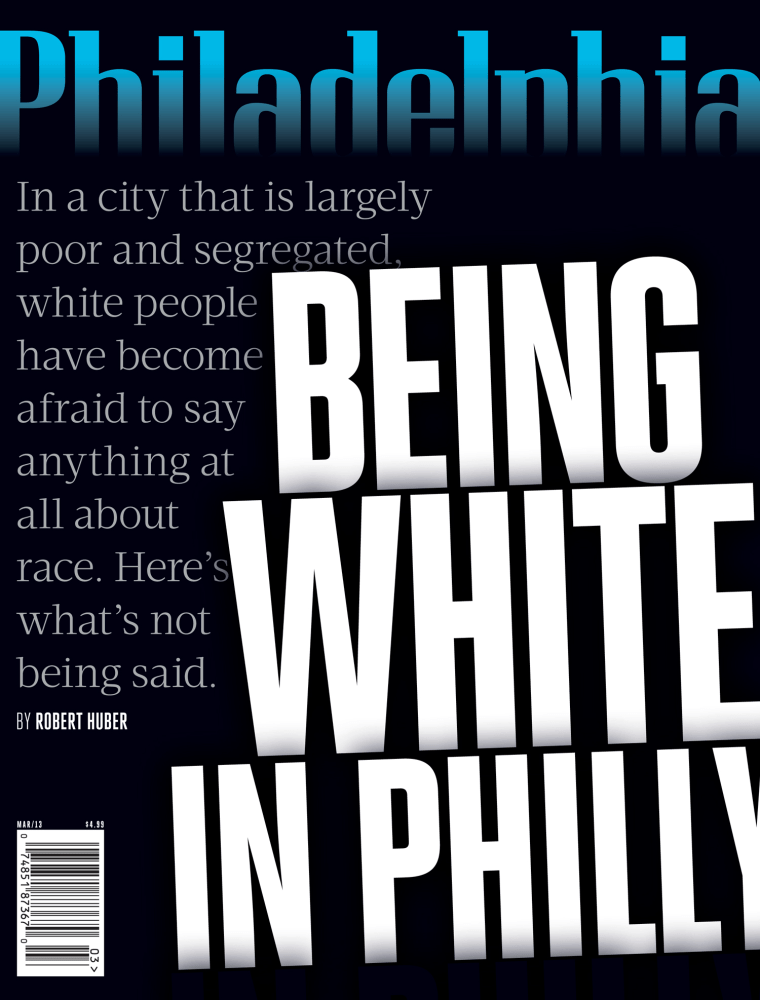This month’s Philadelphia Magazine cover reads very loudly.
The cover reads, "Being White In Philly," a reference to the issue’s lead story on how white middle-class Philadelphia residents feel about issues of race, poverty and segregation. The article has been blasted on local Philadelphia city papers, blogs and social media for negatively portraying African-Americans.
Philadelphia mayor Michael Nutter recently called parts of the story "disgusting."
The story’s writer, Bob Huber, spent several weeks in the Fairmount neighborhood of Philly talking to middle class white residents about how race "affects them."
One response from a woman Huber identifies as "Anna":
"Blacks use skin color as an excuse. Discrimination is an excuse, instead of moving forward. It’s a shame–you pay taxes, they’re not doing anything except sitting on porches smoking pot…Why do you support them when they won’t work, just make babies and smoking pot? [...]"
Another response from 87-year-old "John," who recalls an encounter with a young boy who came into his house:
"It was a ni**er boy, a big tall kid. He wanted money."
Other "responses" from white residents include tales of black drug dealers and thieves.
The magazine’s editor, Tom McGrath, told me in a phone interview Monday afternoon much of the criticism of the article is "fair."
"This [story] certainly had some flaws in it," McGrath said. "We by no means were trying to do a definitive take on race relations in Philadelphia. We set out to do this from one particular point of view."
For many, including writers on the magazine’s own staff, that’s putting it lightly. Steve Volk, a senior writer for the magazine, slammed the entire story for not providing enough context or depth. "Bob assures me he just wanted to let his sources speak for themselves in this story," Volk wrote. "But he seems to miss the obvious here, which is that if white Philadelphians would like to be able to address race without being labeled 'racist,' they should avoid saying racist things. But there are further layers of error and creeping bias to uncover here [...]"
McGrath admits the fallout from the ‘Being White’ article is the biggest reaction to a story he’s seen in his career. The premise of the story made sense, he says—to focus on one specific neighborhood and get reactions from those residents.
The article was not titled, "Some residents talk about being white in Fairmount,” though McGrath insists his headline and the overall issue was not a "marketing ploy."
"I think there’s some things I would re-do," McGrath said about the hot-button issue. "To make it clearer what exactly we were talking about, the packaging of the story [...]. Some people read this as painting all African-Americans with one brush. That’s also something that we should have done a much better job of making clear."
Because McGrath and Huber did not make that clear, the criticism has come fast and furious.
Michael Coard, an African-American contributor to one of the magazine’s blogs "The Philly Post," who grew up near the neighborhood focused on in "Being White in Philly," writes, "I was born and raised about four blocks from there. And I ain’t dangerous. And neither are the guys I grew up with. I’m a lawyer. They’re bus drivers, plumbers, teachers, cooks, factory workers, and city employees. All of us are law-abiding."
Another point of contention? Philadelphia Magazine has zero people of color on its full-time editorial staff.
"It’s not something I’m proud of," McGrath said of his staff’s makeup. "I understand the criticism... I’m committed to working on more diversity within our own staff."
The article’s goal was to start a more open and honest conversation about race and how segregated Philadelphia remains. McGrath tells me perhaps more conversation can change attitudes and change people’s perceptions of one another.
Judging from the initial response to the story and our interview, it doesn’t appear this was accomplished in the intended way.
To his credit, McGrath has been very open to the criticism of his piece, even fielding questions on Twitter when the story was first posted online. Despite the enormously negative response, McGrath said he would not shy away from doing something like this again in the future.
"As a city, as a society, I think we need to be more honest about how people feel about race," McGrath said. "A lot of those feelings are really, really ugly--we see that in [this] story--but I don’t think we do ourselves any favors if we pretend those views don’t exist."
McGrath said there have been talks to continue the strong reaction to "Being White in Philly" in some sort of public forum for city residents in the next few weeks. He admits he doesn’t really have any details on how that "event" will take place.
Rest assured, the fallout from this article isn’t over.
Todd Johnson is a correspondent and video producer for theGrio, where this article originally appeared.
